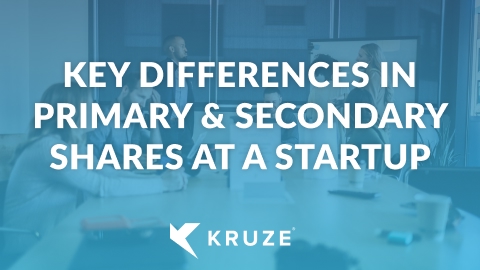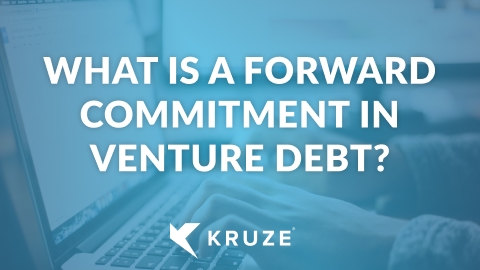What are bridge loans? How do they work? Why should companies take them? Follow along as Kruze Consulting’s COO, Scott Orn, breaks down bridge loans, their purpose, and whether or not your startup should pursue one.
Bridge Loans
A bridge loan is a short-term loan startups can use to secure permanent financing or remove an existing obligation. The loan, typically, comes from a company’s inside venture capitalist (VC) investors. If a company has taken VC funding in the past ie. from a large fund that has significant financial means, that company can go back to the VC investors one additional time if in dire need. This could include poor financial performance or missing the necessary milestones needed to raise money from an outside lead or new investor. This “loan” is a lot like equity, in that it comes from equity investors and it will be in a security that converts into equity if things go well. Note that many companies that are not-VC backed may take a legitimate debt security if they get a bridge loan. We talk more about the types of debt that VC-backed companies can get on our venture debt page.
When a startup realizes the need for a bridge loan, they’ll set up a board meeting to discuss what is at stake. For example, a startup could be in a very uncomfortable position because they are not hitting their plan. They could also be hitting their plan, but realize they need three more months of runway extension before they can raise a new seed round. Nonetheless, the board will discuss the current situation. Based on that discussion, the board will either volunteer to do a bridge loan, ie. put more money in the company, or the startup’s CEO and founders will petition the investors for a bridge loan.
A bridge loan is a bridge to the next round of capital raise. But, if you’re not careful, it can become a pier.
Kruze Consulting once worked with a founder whose venture capitalists told their startup that bridge loans are bridges, not piers; investors do not want to put more money into the company just to have it run off the bridge, onto the pier, and into the ocean. They don’t want to lose their money for naught. It is imperative that startups understand the milestones necessary to raise the next round of funding, especially after securing a bridge loan. Normally, startups can go back to VC investors once for more money, but they cannot go back a significant amount of times.
Getting more than one bridge loan is unlikely. When asking for a bridge loan, make sure it counts.
Once you’ve received the go-ahead, and the bridge loan comes in, it will either be a convertible note or a SAFE note. Convertible notes and SAFE notes are very similar, however, to learn more about their differences, check out our videos on those two notes on our Venture Financing page. Convertible notes and SAFE notes will not price the round immediately, rather it will have a conversion cap that favors the venture capital investors due to the fact they are putting in money at a difficult time. Once the next round comes, the startup waits for the next round to convert the SAFE note or convertible debt into the next round or, in rare cases, a preferred valuation round. However, founders do not want to linger in valuation territory too long because it shows the company may not be in the strongest position. Founders do not want to price a preferred round and venture capitalists understand that startups are stronger if they wait during a preferred round and let the next investor price it. Nevertheless, this is quite rare.
Before approving a bridge loan, investors have done their pro-rata ahead of time. This is because there may be opportunistic situations where the board realizes the startup is doing spectacularly, and they may get squeezed out on some of their pro-rata when a bigger investor comes in down the line. A bridge loan creates a reverse or atypical incentive for investors to put more money into a successful company. This can also be called an extension round.
Bridge loans can have a negative connotation. To avoid concern from investors, call bridge loans extension rounds.
Bridge loans tend to imply that things are going south. But this is not necessarily true. The venture capital ecosystem is flush. Many venture capitalists have realized doubling down and getting some extra money into their successful startups is a smart and proactive choice.
A bridge loan is a loan without the same security features as a typical bank or fund loan.
Bridge loans, usually, do not take a lien on IP. They don’t charge expensive warrant coverages unless the startup is in a blatantly difficult place. Then you may see warrant coverage or a two to three times liquidation preference on the bridge loan. However, that is when the company is doing very poorly. If someone offers your startup a bridge loan and requires you to have three times the liquidation preferences on that money, you still may take the loan, but take it as an indication things are not going well.
It’s not a bridge, it’s an extension.
Now, Silicon Valley and the tech ecosystem are famous for having companies that are in a tough situation, get a bridge loan, pull through the difficult stretch, and become a major success. Kruze Consulting always counsels our clients to avoid the term ‘bridge loan’ whenever possible because it has a negative connotation. Rather, call it an extension round. Startups may have to do a bit of salesmanship here to get their board excited, give them their pitch, and get them to put in more money. Oftentimes, you can break a new investor log-jam if you know investors are putting money in through an extension round. For example, a founder can circle back and say, “Hey, a new extension round is coming together. All of my current investors are excited about participating. Are you sure you don’t want to lead and settle a price right now?” If a startup has a stalemate with outside investors, but the insider investors are supportive, a startup can use their commitments within a bridge loan to break the stalemate with the outside investors.
Bridge loans happen often; it is something many companies go through.
Running a startup ride is never a perfect ride. There are bumps and adversity. However, having strong capital partners, including the funds necessary to write multiple checks and assist you when things get rough, will enable a startup to survive. Petitioning for a bridge loan when a startup needs it is valuable. It’s great to have the highest valuation, the coolest partner, or the best brand name firm, but what a startup really needs is people who will back you and believe in you when things are not going well, and write a check, such as a bridge loan, when you absolutely need it.
Kruze Consulting is here to help you achieve every financial goal you have for your company. We hope this helps. If you have any questions or feedback, feel free to hit us up as we’d appreciate hearing from you.















